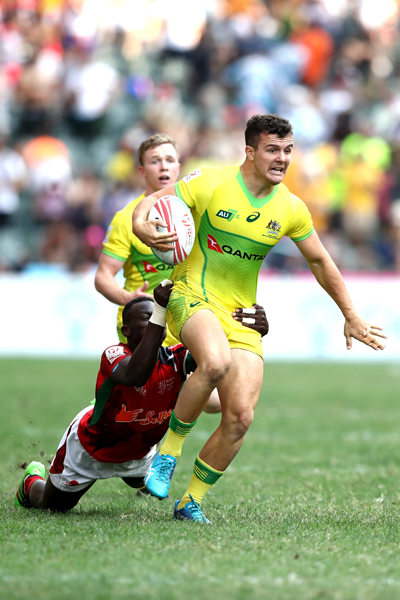20 December 2020
The 2018 conversation that changed everything for Dylan Pietsch came about an hour after the young Australian Rugby Sevens star had attempted to end his life.
Pietsch didn’t really understand what he was going through and realises now that he’d stopped communicating with those most likely to have seen the signs of his depression.
“It was little things adding up, every single day,’’ says Pietsch, 22, who spent nights in tears, trying to cure his insomnia with walks of up to four hours.
“I had no idea that was happening to me. I didn’t know what it was. I didn’t know what depression was, and it was just a very dark place,’’ Pietsch recalls.
“I didn’t know what I was doing with my life. It was just such an unknown space that I’d never had to deal with before, and it was just weird because I didn’t think I would be a person that would happen to.”
The catalyst for his recovery was a call soon afterwards from his father, Troy. It was only then that Dylan learnt of his dad’s own long-term struggles with mental health, and realised that he was neither unusual nor alone.
“We spoke for about five hours and that’s when we had just an open, genuine conversation about his life and what he’s gone through, about my life and what I just did, and how he went through it as well, which was pretty crazy,’’ says Pietsch. “It happens in every family. It’s just about talking about it and realising that mental health is such a big issue and everyone should be talking about it, because no-one’s perfect.’’
Pietsch is now speaking up and often, sharing his personal story with schoolchildren as part of the AIS Mental Fitness Challenge.
A joint initiative with the Black Dog Institute, the program is designed to improve the mental health, wellbeing and resilience of young Australians, delivered by elite athletes trained to share their experiences with mental fitness techniques and provide valuable tools.
Pietsch, for example, meditates for 10 minutes daily, and uses breathing exercises to deal with pressure situations and fatigue during games. Off the pitch, he emphasises the value of life balance and perspective, having ditched a materialistic attitude and business degree in favour of a commitment to help others through various volunteering roles and plans to study psychology.
And instead of what could have been the crushing disappointment of the Toyko Olympics being postponed for 12 months, the powerful utility focused on the potential upside of a delay he believes will provide the young Australian Men’s Sevens squad - a strong medal contender - with another year of development.
“Mindfulness has helped me a lot,’’ he says. “It makes me so much calmer and just gives me a lot of empathy, and I can look at things from a different angle because my mind’s a lot clearer.’’
In hindsight, Pietsch wonders how he did not become more self-aware earlier.
A member of the Wiradjuri people, Pietsch had left his NSW Riverina home for a Sydney boarding school in Year 8, and now laments the loss of connection with his Indigenous roots and culture during those formative teenage years.
“Growing up that was a big part of my depression, when I look back on it, because I had this empty part of me that I knew was there, but I didn’t explore,’’ he says. “It was just a little hole in my heart; I was an Indigenous man, but I didn’t know the law, I didn’t know how to be Indigenous.’’
Rugby-wise, for the so-called “schoolboy sensation” and aspiring Wallaby who made his senior international Sevens debut in New Zealand at the age of just 17, no longer was there any joy, either, in what had initially felt like a dream job.
Lost and confused, yet feeling an expectation to put on a brave face each time he stepped into the intense Sevens training environment.
“You have this sense that you always have to be strong no matter what, and when you go into adversity, that ‘it’s ok, you’re a rugby player, you’ll bounce back’, but it’s not the reality of things.”
Part of Pietsch’s vision involves sparing other young people the type of belated revelation from his father that, however valuable, would ideally have been shared far sooner.
“I want to create that space in families where they can talk about mental health in a positive and consistent way so they don’t get to where we had to get.’’
Which is all part of a perspective gained from personal experience. A how-to message shared by someone who was in a dark place but, with support, found his way out. A story not just told but lived.
